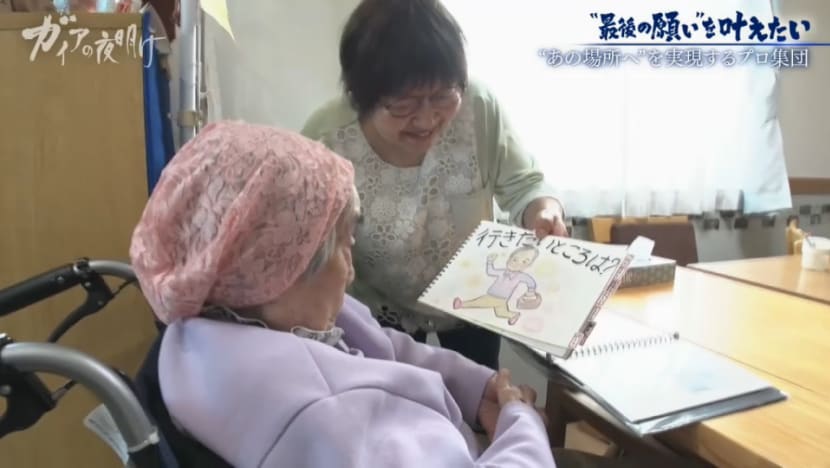Entertainment
Japan Transforms Elder Care with Meaningful Last Wishes

Japan is redefining how its elderly population experiences their final days. With nearly 30 percent of its citizens aged 65 and above, the country faces a pressing need for innovative elder care solutions. In a significant shift, a quiet revolution is taking place in Tonami, Toyama Prefecture, where initiatives aim to ensure that seniors can fulfill their personal wishes in a dignified manner.
This week’s episode of Japan Hour highlights the work of Ryosuke Sakamoto, founder of JEPTO, a travel service tailored for elderly individuals with health or mobility challenges. Sakamoto’s mission transcends traditional tourism; he seeks to provide seniors with not just travel experiences, but a renewed sense of dignity and connection. The episode features a visit to the Tonami Tulip Fair, showcasing three million tulips across the fields, where a group of elderly guests from Aichi Prefecture participates in a memorable outing.
Despite requiring assistance, the seniors demonstrate remarkable determination as they ascend the 26-metre tall Tulip Tower. Encouraged by their carers, they share laughter and camaraderie, showcasing their resilience in the face of aging. “You’re halfway there!” one carer exclaims, while another participant lightens the mood by joking about their remaining years. This shared humor reflects a profound understanding of life, suggesting that these seniors approach aging with wit and grace.
Sakamoto, a licensed physical therapist, provides not only logistical support during the trip but also emotional encouragement. “Thanks to all the support, I can come,” says one participant, highlighting the importance of such initiatives. Following the tulip experience, the group enjoys a night at the Mercure Toyama Tonami Resort and Spa, which is equipped with elderly-friendly amenities. Though the trip costs ¥115,500 (approx. S$1,000), demand remains high, often resulting in sold-out tours.
Reflecting on the inception of JEPTO, Sakamoto recalls a pivotal moment from his early career. He was inspired by Takashi Yamamoto, a patient who, after prolonged rehabilitation, expressed a simple wish: to soak in an open-air hot spring. Making this wish a reality brought Yamamoto immense joy, illuminating the potential for elder care to encompass not only physical health but emotional well-being.
In addition to JEPTO, Sakamoto is the president of P-BASE, a daycare service in Toyota City, Aichi Prefecture, which serves around 850 clients. The organization emphasizes the importance of maintaining health to enable clients to participate in activities that bring them joy. “People exercise so they can go on trips,” Sakamoto notes, highlighting the link between well-being and fulfilling life experiences.
The episode further explores the story of Yoshimi Onoda, a 99-year-old woman wishing to visit her late husband’s grave. Due to advanced dementia and a broken leg, going out has become increasingly difficult for her. Sakamoto takes on the task of creating a custom tour to fulfill Yoshimi’s wish, meticulously planning the logistics to ensure her comfort and safety. The family, spanning four generations, accompanies Yoshimi on this emotional journey, culminating in a heartfelt moment at her husband’s grave.
In another poignant narrative, Hiroyuki Shikata, a 64-year-old man suffering from ALS, desires to revisit the Aichi Expo, a place filled with cherished memories. On 21 May, Sakamoto drives the Shikata family to the expo, where they immerse themselves in experiences that evoke nostalgia and joy. “I hope we can keep spending our days filled with laughter,” says Rumiko Shikata, reflecting the couple’s enduring bond amid adversity.
In Tokyo’s Itabashi Ward, the episode introduces a pioneering facility known as Let’s Go Home Hospital. This institution aims to reframe the narrative around hospital stays, focusing instead on rehabilitation to facilitate a safe return home for patients. Dr. Shinta Mizuno, the hospital director, emphasizes the hope to increase the percentage of individuals who can die at home, currently only 20 percent.
The story of Tokio Tsuruishi, a 76-year-old lung cancer patient, encapsulates the mission of this hospital. After a successful rehabilitation, Tsuruishi faces the ultimate choice between another hospital transfer or returning home. His wife, Mayumi, chooses to honor his wish to pass away at home, surrounded by family and familiar surroundings. This decision brings comfort and peace to Tsuruishi in his final moments.
The narratives woven throughout this episode of Japan Hour serve as a reminder that, even in life’s twilight, dreams and wishes remain important. Whether it’s a visit to a spouse’s grave, a nostalgic meal, or a final journey home, the efforts of individuals like Sakamoto and initiatives like Let’s Go Home Hospital illustrate that the last chapters of life can still be filled with meaning, connection, and joy.
-

 Lifestyle4 months ago
Lifestyle4 months agoHumanism Camp Engages 250 Youths in Summer Fest 2025
-

 Business5 months ago
Business5 months agoKenvue Dismisses CEO Thibaut Mongon as Strategic Review Advances
-

 Sports4 months ago
Sports4 months agoDe Minaur Triumphs at Washington Open After Thrilling Comeback
-

 Sports5 months ago
Sports5 months agoTupou and Daugunu Join First Nations Squad for Lions Clash
-

 Top Stories5 months ago
Top Stories5 months agoColombian Senator Miguel Uribe Shows Signs of Recovery After Attack
-

 World5 months ago
World5 months agoASEAN Gears Up for Historic Joint Meeting of Foreign and Economic Ministers
-

 Health4 months ago
Health4 months agoNew Study Challenges Assumptions About Aging and Inflammation
-

 Business5 months ago
Business5 months agoOil Prices Surge Following New EU Sanctions on Russia
-

 Entertainment4 months ago
Entertainment4 months agoDetaşe-Sabah Violin Ensemble Captivates at Gabala Music Festival
-

 Entertainment4 months ago
Entertainment4 months agoBaku Metro Extends Hours for Justin Timberlake Concert
-

 Top Stories5 months ago
Top Stories5 months agoRethinking Singapore’s F&B Regulations Amid Business Closures
-

 Business5 months ago
Business5 months agoU.S. House Approves Stablecoin Bill, Sends to Trump for Signature









